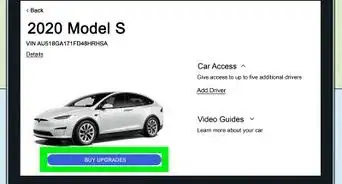This article was co-authored by Amber Rosenberg, PCC. Amber Rosenberg is a Professional Life Coach, Career Coach, and Executive Coach based in the San Francisco Bay Area. As the owner of Pacific Life Coach, she has 20+ years of coaching experience and a background in corporations, tech companies, and nonprofits. Amber trained with the Coaches Training Institute and is a member of the International Coaching Federation (ICF).
There are 10 references cited in this article, which can be found at the bottom of the page.
wikiHow marks an article as reader-approved once it receives enough positive feedback. This article received 21 testimonials and 100% of readers who voted found it helpful, earning it our reader-approved status.
This article has been viewed 1,812,027 times.
Living in a car isn't something that many people would recommend. However, if by either circumstance or choice you don't have a home property, living in your car might be the only reasonable choice, especially if you don't feel safe at a local shelter. Unfortunately, in many places, sleeping in your car is not only frowned upon but also illegal. Luckily, there is some helpful information on how to get by until something better comes along. It's important that you choose the right car, find the right parking spots, and find appropriate and cost-cutting spots to access basic amenities such as showers. This however should be temporary.
Things You Should Know
- Keep your car clean, especially the inside, so it feels comfortable. Invest in a cozy sleeping bag, a pillow, and earplugs to get a good night's sleep.
- Find a safe and inconspicuous place to park. Try big box retailers that are open 24 hours, low-traffic streets without sidewalks, or camp sites.
- Pick a few places to groom and shower regularly, like gyms, truck stops, or rec centers. Alternate so you aren't relying on one place.
Steps
At the Start
-
1Find a suitable car. You can only live in your car successfully if your car works. If you have any lead time and see the writing on the wall ahead of time, get a van; ideally a windowless delivery van of some sort: you will have room under your platform bunk for storage, you can install a rooftop skylight/hatch for air, a rooftop rack for storage and even lookout when the skylight is open. An anonymous-looking white Chevy van or Holden panel van in Australia makes concealment a lot easier. You're going to need a new or "newish" car or be a good mechanic to live in an older car. If you have an old car keep in mind that you're liable to break down at an inopportune moment if you don't stay on top of maintenance.
-
2Before you start living in your car, use your permanent address to:
- Rent a post office box or a Private Mailbox (PMB). Although PMBs tend to be more expensive, you can receive packages at them and some services will let you use an address format that makes it appear to be an apartment; this can be useful when someone requires a physical address.
- Sign up for a gym membership, or, if a gym is too expensive, a more affordable alternative is (depending on your location) to enroll at a local community college where you'll then be able to use their gym facilities.
- Renew any paperwork that will require an address to process soon.
- Put valuables in a safe deposit box at a bank.
- If you have friends or family who can't (or refuse to) help you with your living situation, or you refuse to ask them for help, think about at least asking them if you can use their address.
Advertisement -
3Keep your personal identification, driver's license, car insurance current at all times. Have it readily available for police inspection.
-
4Buy a steering column lock and use it! Why so essential? Because if your vehicle gets stolen, your home is stolen, you may never see it again and then you really are in trouble! It's not just your property like it would be to someone with a home or an apartment - it's a matter of your survival. Buy one now! You can buy one for about $20.
Finding Safe and Inconspicuous Places to Park
-
1Find a safe and inconspicuous place to park. First, check with any friends or relatives to see if they will let you park on their property. If not, check to see if there are any organizations or businesses in your area (or a nearby area) that designates parking lots specifically for people in situations like yours; for example, Walmart allows people to camp overnight in their parking lots. It's not only legal, but the organization might screen the people who use the lot or even designate a women-only lot.[1] If there are no such lots available, and you live in an urban area, look for streets with no sidewalks, no overlooking windows, and adjacent to woods; the area should be sparse enough to avoid nosy onlookers but populated enough that the car does not stand out.[2] Parking lots of big-box retailers (especially those that are open 24 hours and have restrooms, such as Walmart) are great to clean up in and have security, as long as you spend a couple of dollars there and don't park in one place too often. Parking lots however can be noisy, particularly in the morning as trucks arrive carrying food and goods. [3]
- Church car parks are often quiet during weekdays. If you check around, you may find a church that is less used than others. This could be a good place to park, and you may be able to ask for assistance at the church. You might even attend the church to gain rapport, but wait a while before telling others about your situation, and tell only those who seem trustworthy and willing to help.[4]
- Industrial estates and business parks are often noisy by day, but very quiet at night. Small ones close to residential areas are best. They have to be quiet at night. You may encounter security in some places like this, but if you are honest, saying you are just sleeping the night in your car, they usually won't bother you. Their main role is to protect the property.
- University car parks. This is okay if you are a student, but not so good if you are not associated with the university. You may be required to get a parking permit.[5]
- Camping grounds are another option, although they usually have time limits and some are almost as expensive as a hotel room. Some offer a shower for a nominal fee. National Forests have some free camping with a limit of 14 days.
- Yacht harbors are notoriously 'free zones'—given the nature of fishermen and boats, so marinas offer a lot of services, like hot showers and transient vehicles. If the season is high, larger boats from out of state show up and stay for months along with their respective crews, all of whom are 'transients' providing excellent cover for you and your vehicle. They don't know or care, and if they find out they still don't care, being a 'little wild' themselves. Hang around on the weekend and meet someone who wants their boat washed and waxed—that'll do it, from there on in you'll have a gate/shower key and legitimacy.
- If there's no restroom, having a creek nearby helps for rinsing purposes. Know how to safely defecate outdoors and make a poop tube. Five-gallon bucket with a lid and lye for odor can also work.
- A free hospital parking lot is another option. If approached by a guard, you can say that you're waiting to visit a sick relative.[6] However, note that in Australia, due to past murders of nurses, you may attract police attention by parking in a hospital car park. You may be asked to move on by security.[4]
- If you can establish rapport with the manager of a retail store or restaurant, they may not give you problems about staying overnight, especially if they see your presence as a form of overnight security.
- Try a hotel parking lot. Hotels and motels along the interstate allow cars to park until 11:00 a.m. the next day (checkout time). As long as your seat reclines fully, no one will notice you. However, you'll need to keep moving on.
- Once you find a spot, try to arrive late at night, and leave before 7 am. This will draw as little attention as possible to yourself.
-
2Get earplugs. Due to noise, you might find that you will need earplugs to sleep. Earplugs will block a lot of background noise to a level that is bearable. Earplugs are good for blocking out traffic, birds, animals, talking, and background music. They will not block out very loud noise or close noise, such as someone tapping on your car.
Finding the Essentials
-
1Get the things you'll need. The basic essentials for living in a car are a blanket, a pillow, and a mattress or some other padding. Due to the angles involved in the seating setup, you may develop dull back pain from the cramped quarters. Should this happen, be sure to have pain medication on hand. Once you have your sleeping gear, you'll want a blanket to place over the back seat, and draped over the two front seats. This will block light and people's views.
- A cheap cooler will help make life easier. The main thing the cooler needs is to be waterproof. Cold food will cause condensation, while ice will melt. You don't want that water inside of your car. A cooler will help keep your perishable food cool. It will work most efficiently when full, so add bottles of cold water to it as you take out food. If you choose to buy an electric cooler, it will need good ventilation to work. For this reason, it will not work well in your car's boot. It is best placed within the car when running. Make sure it is only running when the engine runs, or use a low voltage cut-out device, as explained below. Make sure the cooling vent grille is not touching anything as it exhausts waste heat and may set some things on fire.
- One essential item, if you can afford it is a Porta-Potty, a chemical toilet. These devices can really make living in a car bearable. They can be purchased for under $100 new these days. If you can't afford a Porta-Potty or don't have room for one, you can pee into wide-necked bottles like Gatorade bottles, or make an improvised bucket-style toilet.[10]
-
2Buy a combo backup battery/air compressor to jump-start your car on your own. Have a spare tire and at least one can of tire sealant. Be sure the sealant is of the type that can be removed.
-
3Find alternate ways of generating electricity. A cigarette lighter converter is one option. These are useful for powering low-consuming devices (100 watts), but if you plan on using your vehicle for cooking, then you'll need to draw power more directly from your battery or you'll blow the fuse. Running electric cooking appliances from your car though is fairly impractical without an expensive dual battery and inverter system. There are small 12-volt water heaters and skillets, but these generally are not very efficient. You will also need a much more expensive inverter if you plan to run things that use mains voltage. You may need to idle the vehicle while drawing this power if you don't have a dual battery system, however, even then, car alternators are not designed for such use and may not be able to produce the current you need.
- A good buy for any car dweller is a low voltage cut out device.[11] This device protects your car's battery by cutting off the electricity once the battery reaches a voltage where it can still start the car, but can't really run plug-in devices much more. These usually retail for about $25-$40. They are a very good investment for a car dweller, as continual flattening of your battery will damage it, resulting in a costly replacement, and inconvenience of not being able to start the car.
- An alternative to electric cooking devices is to use gas for cooking, but do not use this inside the vehicle for safety reasons. There are many dangers associated with cooking inside your car: unstable surfaces, fire hazards, burns from hot metal or spilled liquids, carbon monoxide build-up, smells. Cooking is for outside of the car. If you live in a van with a stable set up for cooking, then cooking inside is okay, provided there is ventilation.
-
4Have something portable to store your items. Get bags you can fill with your soaps, clothes, cell phone, etc. Keeping things in order will save you a lot of hassle. A vehicle may seem like a small space, but losing things can be extremely easy. Also, keeping things neat inside the car will draw less attention from people passing by who happen to look in the windows. Hiding your bedding might be a good idea (consider the trunk). If there is not room in the car for a week's worth of clothes and supplies, try to leave them at a friend's for safekeeping, and then you can have a reason to come over, and they may give you a shower and a place to hang out. When you do your laundry, be sure to get them bone dry, as you do not want damp clothes to mildew or smell bad in the car. When you're not in the car, leave windows cracked and dryer sheets scattered about to keep the interior smelling decent. Wash your sheets once a month, or else you risk smelling like a homeless person, which will blow your cover and get you treated like a homeless person.
-
5Keep dirty clothes separate in plastic bags so they do not smell up all your clothing.
-
6Get a good quality flashlight. A 3 or 4 battery Maglite flashlight serves two purposes: lighting and security. It is large enough to act as a metal baton to defend yourself, should the need arise.
Community Q&A
-
QuestionWhat if you plan on staying in a car permanently instead of temporarily?
 Community AnswerYou may have to rent a storage unit for your possessions, as well as a P.O. box so you can receive mail, and you will need to find somewhere to safely park your car, as well as somewhere to bathe regularly.
Community AnswerYou may have to rent a storage unit for your possessions, as well as a P.O. box so you can receive mail, and you will need to find somewhere to safely park your car, as well as somewhere to bathe regularly. -
QuestionI may need to start living in my car, but I live in Florida. How can I keep cool and have my windows rolled up?
 Community AnswerYou'll need to block the windows to keep out the sun and park in the shade when at all possible. I would also invest in a small cooler and keep it stocked with ice.
Community AnswerYou'll need to block the windows to keep out the sun and park in the shade when at all possible. I would also invest in a small cooler and keep it stocked with ice. -
QuestionHow do I live in my car and live rent free?
 Community AnswerKit your car or camper out as the article says, and park near a gym where you won't get bothered. I heard about a woman who did this in LA and saved up $72,000 in 18 months, she pretty much lived at the gym.
Community AnswerKit your car or camper out as the article says, and park near a gym where you won't get bothered. I heard about a woman who did this in LA and saved up $72,000 in 18 months, she pretty much lived at the gym.
Warnings
- Never sleep in the driver seat if you can avoid it. Your body will quickly associate that seat with sleeping, creating risks when you are driving - especially when you're tired. Recline the passenger seat or lie down in the back if there is room.⧼thumbs_response⧽
- Be careful who you tell that you're living in a car. If they're not likely to provide assistance, then don't bother, because you might end up endangering yourself.⧼thumbs_response⧽
- If you are sleeping in the car on a regular basis, do as few other things in the car as possible. Don't eat, read, or anything else that will cause you to spend more time than necessary in the car. The more time you spend in it, the more smells will accumulate.⧼thumbs_response⧽
- Always ensure adequate air-flow in the car's cabin. Make sure you don't shut off the air-flow through the vents, and don't use a car cover.⧼thumbs_response⧽
- Be aware that having a gun in the car carries its risks. If you are startled awake and point the gun at the wrong person (i.e. a cop tapping on the window), you can wind up being shot yourself.⧼thumbs_response⧽
- Stay sober at all times. A clear mind is your best safety and security tool. Be smart, courteous and truthful and you will not be a threat.⧼thumbs_response⧽
- Your car is a weapon if you stay inside it. Remember that. If a police officer tells you to do anything, follow directions exactly as told, or they are authorized to use deadly force against you, if you are still inside the car. Never move any body part until told to do so.⧼thumbs_response⧽
- If you have been homeless for a while, you may not have money for car insurance. Be aware that you can be considered a vagrant. Your car may be impounded.⧼thumbs_response⧽
- Avoid driving the car. While it seems harmless, police do not take kindly to marginalized people. A danger is that they may write a report about you to a government office in the hope that they'll cancel your license.⧼thumbs_response⧽
- Don't drink alcohol. Don't even bring any alcohol into your car. If cops find you with alcohol in your blood or in your car, you could get in serious trouble, even if you're not driving at the time.⧼thumbs_response⧽
Things You'll Need
- Car with insurance and license
- Blankets and pillows
- Towels and wash cloths
- Soap and shampoo
- Disinfectant and/or antibiotic ointment
- Water
- Gas
- Food
- Gym membership (you will stay clean and work off stress)
- Automobile association membership (if your car insurance doesn't include Roadside Assistance)
References
- ↑ http://www.cnn.com/2008/LIVING/wayoflife/05/19/homeless.mom/index.html
- ↑ https://www.nytimes.com/2006/04/02/us/keeping-it-secret-as-the-family-car-becomes-a-home.html
- ↑ 3.03.1http://www.carliving.info/101.htm
- ↑ 4.04.1http://www.carliving.info/parking.htm
- ↑ http://www.carliving.info/parking.htm
- ↑ https://www.nytimes.com/2006/04/02/us/keeping-it-secret-as-the-family-car-becomes-a-home.html
- ↑ http://www.carliving.info/myths.htm
- ↑ http://www.carliving.info/parking.htm
- ↑ http://au.youtube.com/watch?v=G7-gPZEzVy4
- ↑ http://www.carliving.info/bathing.htm
- ↑ http://youtube.com/watch?v=BBtFT7LRY4o
- ↑ live-frugal.blogspot.com/2008/02/stealth-living.html
- ↑ http://www.the-spark.net/np749603.html
- ↑ http://seattletimes.nwsource.com/html/nationworld/2003590929_outofdebt27.html
About This Article
To live in your car, start by finding somewhere safe to park at night, like at a friend or family member's house. If that's not an option, park at a church parking lot or at a national forest that offers free camping. If you can afford it, get a gym membership so you will have a place to shower and use the bathroom. If you can, get a small cooler to store cold beverages and food in your car. You might also want to get a post office box or ask a friend to use their address so you can receive important mail. To learn how to stay under the radar while living in your car, keep reading.
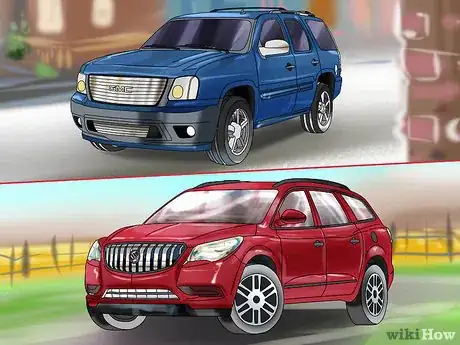









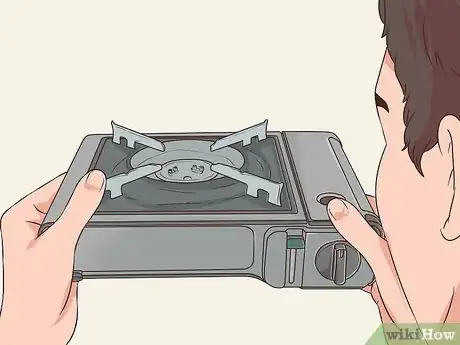


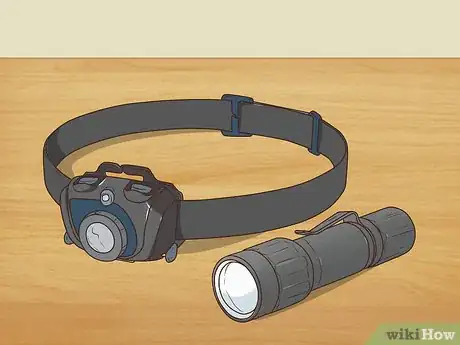






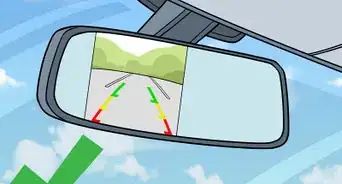
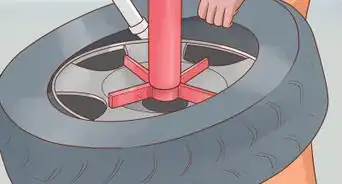


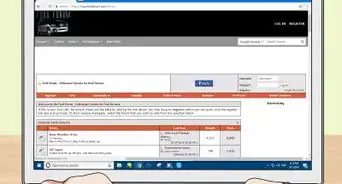
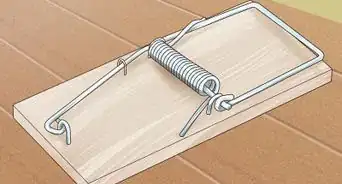
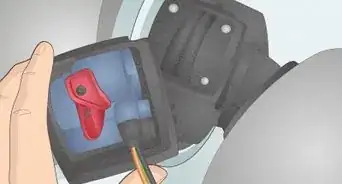
-Beetle-Step-5-Version-3.webp)
